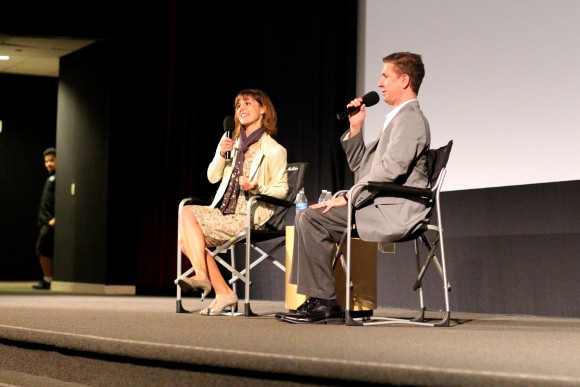Film Studies: A Critical Approach to the Literature of this Century
January 5, 2016
EDITOR’S NOTE: This article is from an issue of InProduction, and we thought it perfectly showcases our Film Studies program, so we had to share it!
“Film studies is the English degree of the 21st century,” says Professor Emily Carman.
Although she does not discount the value of studying literature, Professor Carman’s assessment reflects two intertwined realities. First, that the visual media are increasingly supplanting written language (an occasion the merits of which are deeply and hotly debated in many quarters beyond academe). And second, that many young people are simply attracted to the study of a subject they love—film.
“If it is not the English degree of the 21st century,” says Erik Castanon (BA/Film Studies, ’15), “it is definitely the liberal arts degree tailored for the needs and interests of the 21st century.”
More importantly, says Dean Bob Bassett, “film is the literature of this century. Film is the way we tell each other stories and ask ourselves questions about who we are and why we are here. Literature has always fulfilled that role in society, but film today has a far greater reach in society at large. Personally I wish everyone would read and study the great works of literature. But to ignore what film contributes to the conversation is literally to miss out on the primary conversation taking place about the stories we tell each other as human beings.”
Yet why study film, in an era when “what career will this major prepare me for” is a driving question for both students and parents? Many students see film studies as a good choice for a minor, where they can indulge their passion for film and still pursue a more defined major/career path. Others, perhaps more committed to film but reluctant to depend on a liberal arts focus alone, choose a double major in film studies and, often, a major like business.
“Film studies is often not taken seriously,” says Professor Nam Lee, “because films are too close to everyday life. There may be people who don’t read, but everybody thinks they can talk about film.”
And everybody does—on Rotten Tomatoes and on social media, on podcasts and through YouTube parodies, the barrage of public opinion is fast, relentless and often mindless. Directorial choices, the faithfulness of a book adaptation or the choice of a given actress for a lead role are endlessly debated. Having seen plenty of “behind the scenes” videos and read interviews with directors, cinematographers and editors, people feel comfortable weighing in on subjects about which their knowledge may be shallow or ill-informed.

In the broadest sense, film studies provide “a context for what films teach us about human nature, and about our world,” says Dr. Lee. Today, in particular, studying film is a way to study other cultures, she says, to see how they are reflected in film. In the past, the influence of Hollywood was primarily one-way: the traditions of Hollywood films were carried overseas. Now the flow of storytelling forms is more global, she says, and film studies can help students understand the thought behind differing narrative structures and cultural traditions.
In addition, film studies asks students to engage in a scholarly dialogue with other scholars, says Dr. Lee. And, for the broader student population for many of whom writing is a challenge, the analytical challenge of a scholarly paper demands “learning to articulate and vet your ideas,” says Dr. Carman, skills that can be useful in pitching a project for funding or in attracting the participation of key talent or applied to work in virtually any field.
As an art form, the observations that film offers on the culture at large intersect directly with many other areas of study, says Dr. Carman. “Film raises questions related to journalism, about the value of fiction versus non-fiction. It explores how we see history, how ideology affects our perceptions of gender and women’s rights, about how we see the future. And it often addresses questions that can’t be discussed in the mainstream media.” All of these questions and more are explored in film history classes as well as a wide range of genre and topics classes, from horror films to censorship.
Film studies classes also offer tremendous advantages for students who wish to become filmmakers, which is why the key film history classes are required for film production majors. “If you want to write a good book, you need to read classical novels,” says Dr. Carman. In the same vein, aspiring filmmakers need to see good movies because most young filmmakers start out by imitating the past, Dr. Lee points out. “A filmmaker can get technical help,” she says, “but to tell a good story, you need to be exposed to good movies. If you want to do something new, you have to know what’s been done before.”
As Professor Carman’s father admonished her when she started college—“you should go to college to learn, to expand your mind.” That indeed is the role of film studies today—to help students understand how history, society and culture have shaped, and continue to shape, how we see ourselves, how we see others, and how we understand our world.
Who studies film studies?
Students who choose to major in film studies, in either Chapman’s undergraduate or graduate film studies programs, “love researching or dream of working for the new Academy museum,” says Dr. Carman. Others, she says, “love movies, but find the idea of directing intimidating at the age of 18.”
Students currently majoring in film studies are pursuing a wide variety of minors, from business to psychology, history, women’s studies, anthropology and sociology. Double majors are common with theater and English. And students in the film studies minor are majoring in everything from health sciences to creative producing, economics, art history and creative writing.
Where does film studies lead?
Many find film studies an open door to a wide variety of work in the industry. Dr. Carman has seen recent grads go to work for talent agencies or on film crews. One recent grad is a writer for Comedy Central. Another is a critic for the
LA Weekly
.
Film studies majors are interested in working in film archives as well as in a wide range of other related areas. Natasha Peralta (BA/Film Studies ‘15) plans to be script supervisor. Erik Castanon (BA/Film Studies ’15) intends to go on to grad school for a business entertainment degree to ultimately work in talent management or development. Haley Shepherd (BA/Film Studies ’16) wants to be a casting director.
They also find industry-related internships. Caitlin Manocchio (BA/Film Studies ’17) has already completed two, at the Writer’s Guild Foundation Library and at Backstage Magazine in the casting department. She intends to pursue a Masters degree in library science in preparation for work as a film researcher and archivist.
Film around the world: From Hollywood to Korea
A growing range of extracurricular activities are available to students interested in film studies through Dodge College. January classes have been traveling to the Sundance Film Festival for years. More recently, film students have accompanied Professor Carman to Bologna, Italy, for the Il Cinema Ritrovato film preservation festival. And Professor Lee opens the door to the expanding world of Asian cinema by taking students to the Busan International Film Festival, known as the Cannes of Asia, in South Korea each year.
Locally, students visit various film archives in Hollywood for research and are treated to screenings of silent films with live musical accompaniment such as
The Hoodlum
(director Sidney Franklin, 1919) sponsored by the Mary Pickford Foundation and the Academy Film Archive.
Meet the faculty
Dr. Nam Lee
is an Asian cinema specialist, teaching classes such as Survey of World Cinema, Asian Blockbusters and Film Theory and Criticism. Teaching Asian cinema to American students puts some cultural differences in stark relief. For example, she says, American students tend to be very happy. Enjoying advantages that young people in other countries do not, American students are less likely to look at society critically than their European counterparts, for example, where wars have helped shape the role of film in society. Some students, she observes, are so conditioned by Hollywood films that when they watch films from other countries they see gaps between the storytelling style they are used to and storytelling conventions in other countries.
Before she came to the U.S. to earn her Ph.D. in Critical Studies at USC, Dr. Lee was a film critic and journalist in Seoul, Korea, where she covered film festivals around the world. The contacts she made in Korea have been invaluable in her ability to arrange special meetings for students with directors and others at the Busan International Film Festival. In addition, Dr. Lee has brought the major Korean directors (Park Chan-wook,
Stoker, Oldboy
; Bong Joon-ho,
Mother, The Host, Snowpiercer
; and Kim Jee-woon,
The Good, the Bad, the Weird
and
The Last Stand
) to the U.S. for Chapman’s Busan West Film Showcase which introduced students and the local community to major works by Asian filmmakers. Her goal as an educator, she says, is to help her students be open to differences and explore new possibilities in cinematic art.
In Dodge College, where interests in Hollywood mainstream filmmaking, the best films of the past, and the emerging markets of Asian cinema come together,
Dr. Emily Carman
brings expertise in film preservation and in the classic Hollywood films of the late teens through the ‘40s, when she notes, “movies were
the
mass medium” and had more of a cultural impact without today’s competition of TV, the Internet etc.
With a Ph.D. in Cinema and Media Studies from UCLA, Dr. Carman has written extensively about the studio system and media industries, including the emergence of female stars as freelance labor in the 1930s and the way in which legal infrastructures influence and regulate the content, distribution, and consumption of film and media. She teaches classes in film history as well as Survey of American Cinema, Film Historiography, and topics classes such as U.S. Postwar Cinema and Censorship.
Her experience in film archiving and preservation at Warner Bros. Archives and the Academy Archives, among other major archives, is a driving force behind field trips to major collections in Hollywood as well as the newly inaugurated summer travel course to Bologna, where students can see classic films as they were meant to be seen, with “big, enthusiastic audiences.”
EDITOR’S NOTE: Since this article came out, we’ve since added Dr. Kelli Fuery to our Film Studies faculty.



